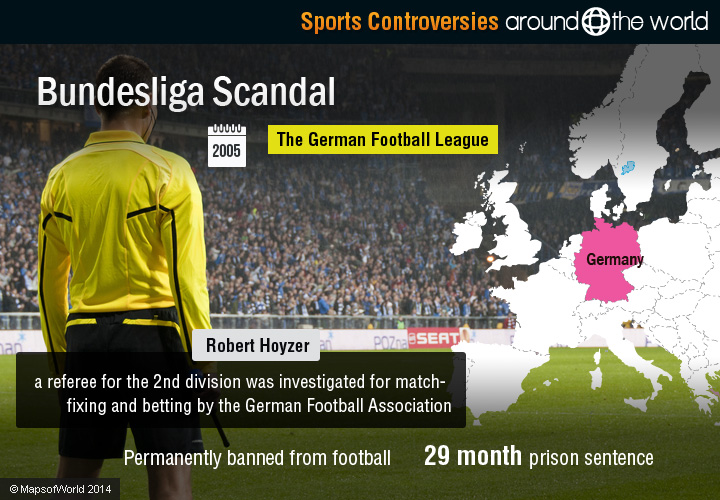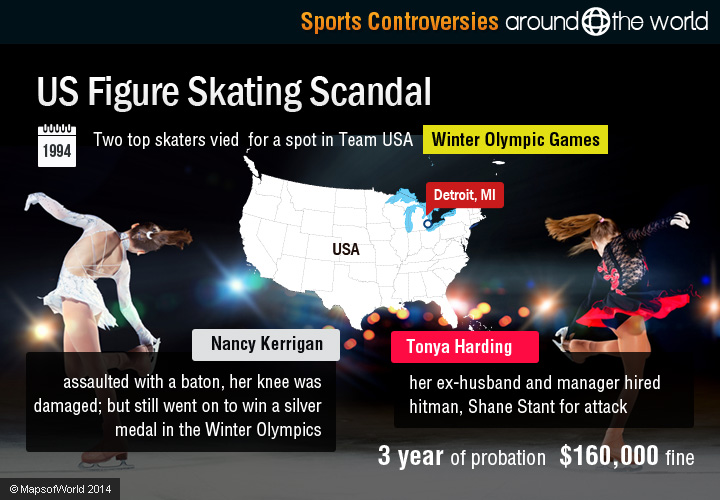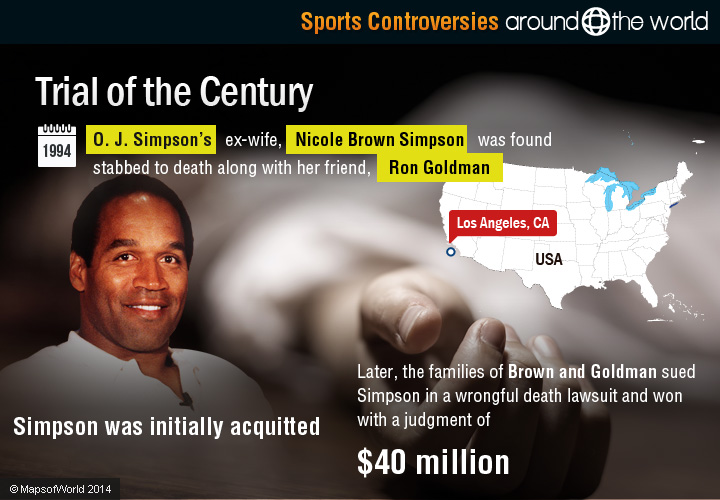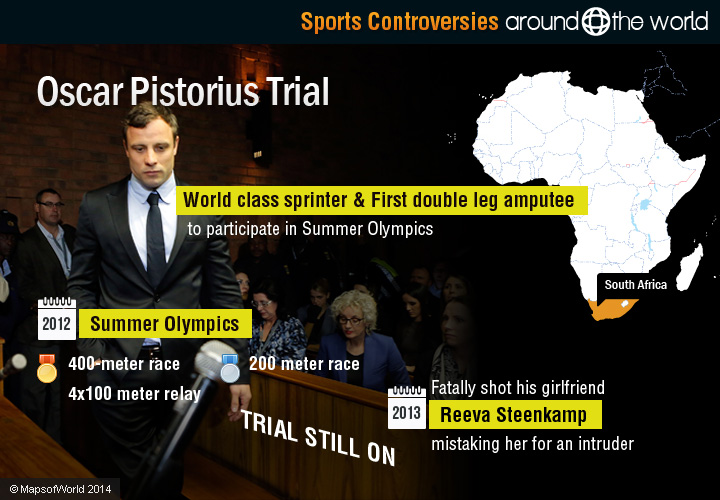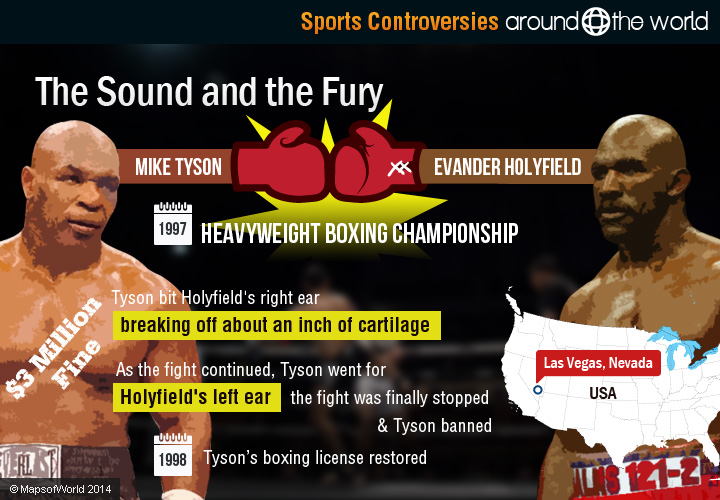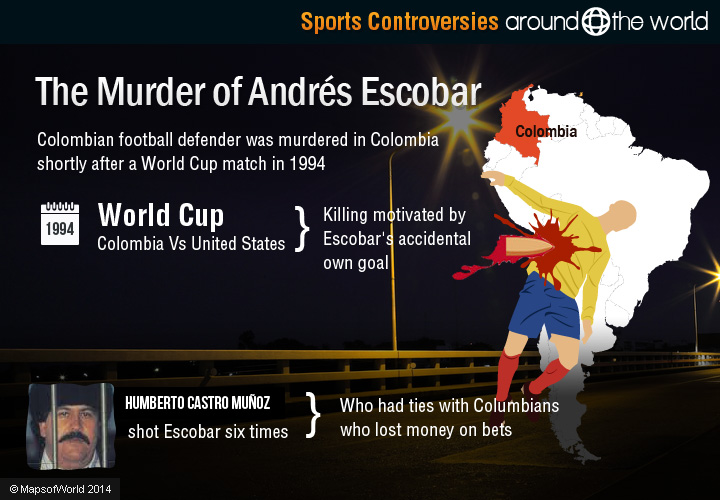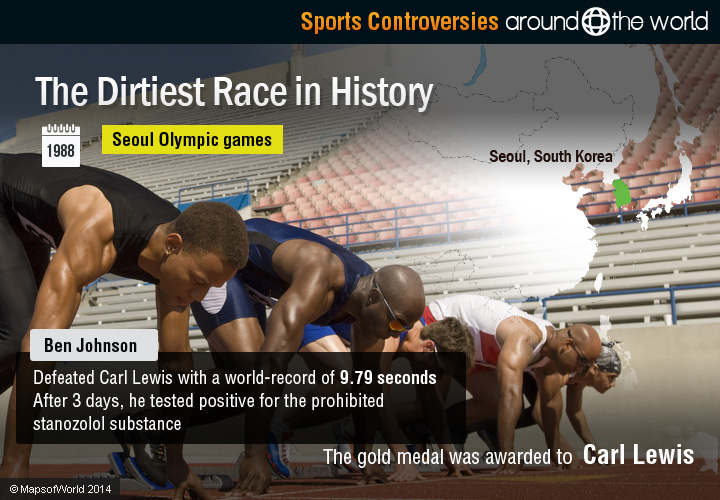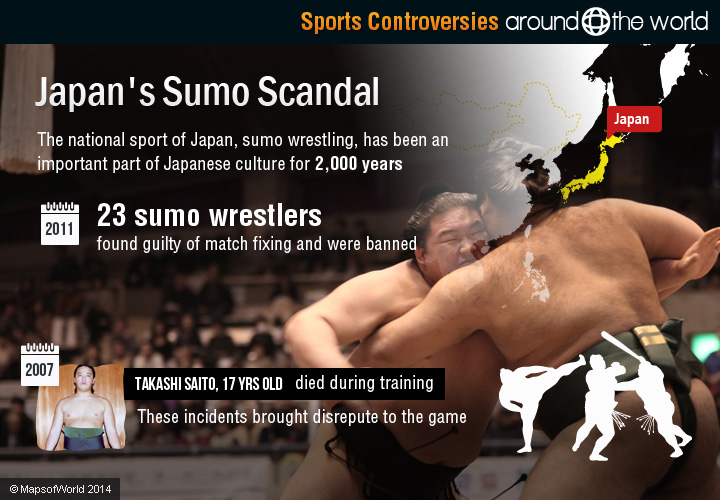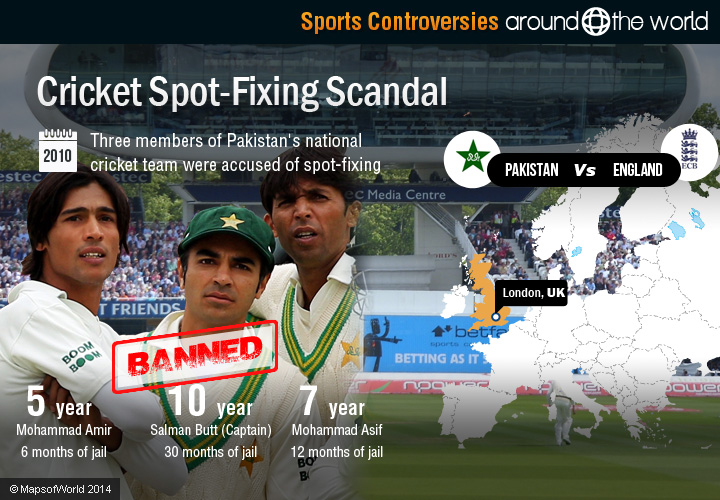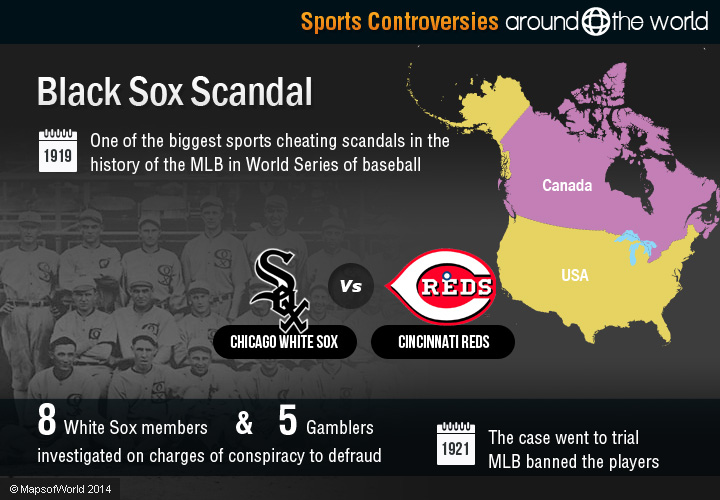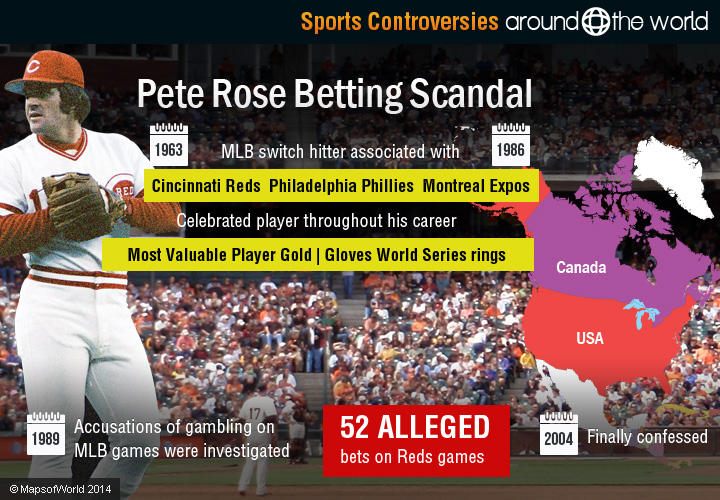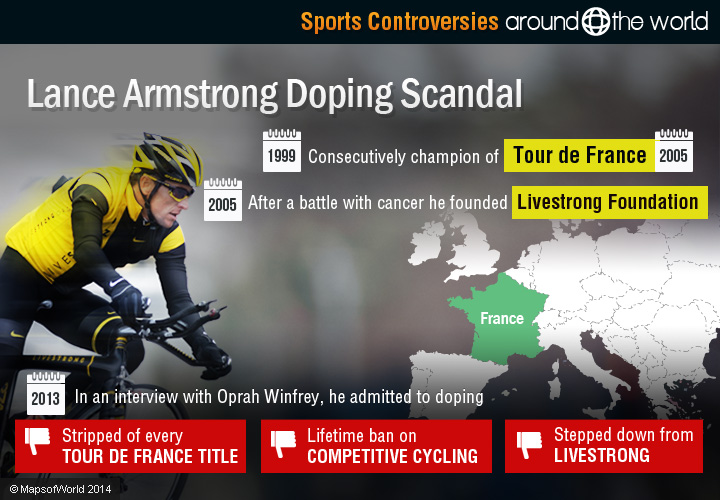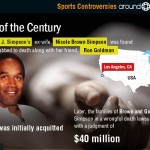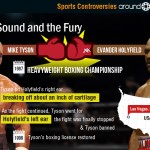Sports Scandals Around the World
Sports have been corrupted by scandals throughout history, from teams and coaches cheating and fixing matches to athletes taking the competition too far or using performance enhancing drugs. To become a professional athlete takes drive, dedication and a strong will to succeed. Some of the same traits that go into making a great athlete are the same traits that can make them take it too far. Athletes sometimes begin doping to remain competitive in their sports, and despite drug testing, schemes to get around the rules get more sophisticated, allowing it to continue.
The credibility of some sports, such as competitive cycling, has been called into question after doping allegations have overwhelmed the sport. When athletes rise to the status of a celebrity, the desire for more wealth can sometimes lead to corruption and willingness to throw games. In the worst cases, athletes have turned to violence, both on and off the playing field, with brutal fights and even murder. Sometimes, it’s the fans who take the game too seriously, whether because of gambling losses or passion for the sport. Here’s a look at some of the biggest sports scandals of all time.
Lance Armstrong Doping Scandal
Cyclist Lance Armstrong had long been considered a hero for his 7-year-run as the Tour de France champion consecutively from 1999 to 2005 after a serious battle with cancer and founding the Livestrong Foundation. Armstrong first retired in 2005, though he made a comeback from retirement to compete between 2009 and 2011. After denying the persistent allegations of doping throughout his career and passing every drug test, Armstrong finally came clean on a television interview with Oprah Winfrey in 2013.
Armstrong admitted to doping, using banned substances, the blood-booster EPO, blood transfusions, and human growth hormones. Armstrong implicated his competitors in the scandal as well, considering his actions simply leveling the playing field, and suggesting that all contenders for the title also took part in doping. Armstrong was just part of one of the worst sports doping scandals of all time. The fallout from his confession was severe: Armstrong was stripped of every Tour de France title, banned from competitive cycling for life, stepped down from his role with Livestrong, and lost all endorsements and the respect of most of his fans, fans of cycling, and cancer survivors everywhere.
Pete Rose Betting Scandal
Pete Rose was an MLB switch hitter who played for the Cincinnati Reds (1963-78 and again in 1984-86), the Philadelphia Phillies (1979-83), and the Montreal Expos (1984). Rose was a celebrated player throughout his career, winning Rookie of the Year, Most Valuable Player Award, two Gold Gloves, and three World Series rings. When he returned to the Cincinatti Reds in 1984, Rose worked as both a player and a manager. Rose retired from playing in 1986, but continued to manage the team until 1989. Rumors of a sports betting scandal led to accusations of Rose gambling on MLB games and these were investigated in 1989, including 52 alleged bets on Reds games, even betting against the team he managed, which is against league rules.
Rose held that the accusations were untrue, but the case became a lawsuit and Rose accepted permanent ineligibility from baseball, making him also ineligible to be inducted into the Hall of Fame.
Rose finally confessed in 2004 to betting on MLB games during his time as a manager, though he maintains that he never bet against his own team, but bet on his own team winning.
Black Sox Scandal
One of the first big sports cheating scandals in the history of the MLB was the Black Sox Scandal of the 1919 World Series. The scheme involved eight team mates from the Chicago White Sox, who were competing against the Cincinnati Reds in the World Series of baseball. Even before the first games, rumors of match-fixing had arisen. The team was divided – though all disliked the club owner, Charles Comiskey, for underpaying them – half of them devised a conspiracy to throw the game. With the help of gamblers and gangsters, Arnold “Chick” Gandil headed the scheme and involved fellow White Sox teammates, Eddie Cicotte, Claude “Lefty” Williams, Oscar “Happy” Felsch, Charles “Swede” Risberg, Fred McMullin, George “Buck” Weaver, and “Shoeless” Joe Jackson. The White Sox and the Reds played eight games in the series, with the Reds winning 5 games to the White Sox’s 3.
The cheating rumors led to a full investigation, which resulted in the indictment of eight members of the White Sox and five gamblers on charges of conspiracy to defraud. Eddie Cicotte and “Shoeless” Joe Jackson confessed to their part in the fix. The case went to trial in 1921, but evidence, including those confessions, went missing and the players were all acquitted of all charges. Despite the acquittal, the eight accused White Sox teammates were banned from the MLB. The fix was a major blow to the integrity of baseball, and the White Sox dropped from their position at the top of the league. Some believe the event caused the Curse of the Black Sox, which has prevented the White Sox from winning the World Series until 2005.
Cricket Spot-Fixing Scandal
Three members of Pakistan’s national cricket team were accused of spot-fixing in a 2010 sports scandal. The Pakistan national team was up against England in the summer of 2010. The Lord’s Cricket Ground in London is the host of test matches each summer, and this event revealed corruption behind the scenes at cricket matches. Mohammad Asif and Mohammad Amir, both fast bowlers on the team, along with team captain Salman Butt were implicated in a scheme with bookie Mazhar Majeed. In the arrangement, Amir and Asif bowled no-balls at certain points in the game. Majeed was caught on video in a sting operation making the arrangements for the fix, including the bribe money exchange. The video was released by News of the World, causing one of the worst sports scandals.
Though the three teammates denied their participation in the spot-fixing scheme, they did follow through with the arranged no-balls and all three were banned from the International Cricket Council in 2011. Butt received a 10-year-ban with half suspended, Asif received a 7-year-ban, 2 of which were suspended, while Amir received a 5-year-ban.
Not only were the players temporarily banned from the sport, the bookmaker Majeed was arrested in the UK. Majeed and the banned players were tried in court and convicted of conspiracy to cheat at gambling and conspiracy to accept corrupt payments. Butt received 30 months of jail time, while Asif was sentenced to a year, Amir received six months, and the bookie Majeed got two years and eight months of jail time. The scandal showcased the corruption in the world of cricket and the betting markets of Asia, and led to increased scrutiny of the Pakistani matches, as well as new investigations.
Japan’s Sumo Scandal
The national sport of Japan, sumo wrestling, has been an important part of Japanese culture for 2,000 years. This tradition has been plagued by sports scandals, including illegal gambling and fixed matches over recent history. Though reports of spot fixing and other corruptions had been around for years, it was not proven until 2011, when an investigation found 23 sumo wrestlers were found guilty of match fixing, and were banned from the sport.
Even worse, though, was a 2007 incident involving 17-year-old sumo wrestler Takashi Saito, who died from injuries that occurred during training. Though his fellow wrestlers and stable master claimed the injuries occurred by accident during training, the autopsy indicated that he suffered from trauma to the head. It was eventually discovered that Saito had been hazed during training, and when trying to leave, the other wrestlers under the direction of the stable master, beat Saito with a glass bottle and a metal baseball bat. The stable master, Junichi Futasuryu was convicted along with three other sumo wrestlers.
The incident, along with the other corruption surrounding sumo, have stalled the sport’s acceptance into the Olympic Games. However, the Japan Sumo Association has been working to return the sport to its respected role in the country and internationally, and to prevent corruption in the foundation and the wrestlers.
The Dirtiest Race in History
The 100 meters race in the Seoul Olympic games organized in Seoul Sports Complex, in 1988 from September 17 to October 2, played host to what has been chronicled in the world history of sports as the ignominious race of all time. With his stirring performance, Canadian Ben Johnson, had defeated Carl Lewis with a world-record of 9.79 seconds. But, it did not end there, as three days after, he tested positive for the prohibited stanozolol substance – in consequence to which, he was shoved off from Seoul and his medal was confiscated. Thereafter, the gold medal was awarded to Carl Lewis, the silver to Linford Christie, and the bronze to Calvin Smith.
Lesser known fact is that out of eight athletes, five tested positive. However, their cases were dismissed because it was due to the result of “inadvertent use.” Only Calvin Smith of the US, who was given Bronze and Robson da Silva from Brazil have impeccable reputations. Smith even told reporters that he was competing with those athletes, who were on drugs.
The Murder of Andrés Escobar
Colombian football (soccer) defender, Andrés Escobar was murdered in Colombia shortly after making a mistake in a World Cup match in 1994 in one of the saddest sports scandals in history. Escobar had played for the national team of Colombia since 1988, and played in various international cups, including the 1990 FIFA World Cup.
In the 1994 World Cup, Escobar was on the field during the team’s second match of the event, when Colombia was paired against the United States. In an attempt to defend the goal and block the pass of American John Harkes, Escobar accidentally scored an own goal, knocking the ball into his own team’s net. Just six days after the incident, Escobar had returned to Colombia and was out late one evening at a bar in Mendellin.
Escobar was shot six times by Humberto Castro Muñoz, a bodyguard for the Colombian cartel and three accomplices. Reports that Muñoz yelled “¡Gol!” (goal in Spanish) while shooting him led to speculation that the killing was motivated by Escobar’s accidental own goal. The murderer confessed the next day and was convicted of murder in 1995, sentenced to 43 years in prison, reduced to 26 years and ultimately servicing 11 years for good behavior. Muñoz had ties to Colombians who had placed bets on the game, and angry that they had lost money, may have blamed Escobar.
The Sound and the Fury – Mike Tyson and Evander Holyfield
Mike Tyson II went up against Evander Holyfield in the 1997 Heavyweight Boxing Championship, and what resulted was one of the most talked about sports scandals in history. The match was held at the MGM in Las Vegas. Tyson and Holyfield had fought just 7 months prior, with Holyfield defeating Tyson. The rematch, billed as the Sound and the Fury, started out the same way. However, by the third round, Tyson attempted to compete without his mouthpiece, though the referee required him to put it back in and he did. During the fight, Tyson bit Holyfield’s right ear, breaking off about an inch of cartilage before spitting it onto the floor. Incredibly, a doctor cleared Holyfield to continue the fight, with just a two point deduction to Tyson’s score. As the fight continued, even more unbelievably, Tyson went for Holyfield’s left ear, and the fight was finally stopped soon after that. Holyfield’s left ear was scarred, but not torn. When Tyson learned he was disqualified, his anger caused him to lash out at Holyfield, forcing security guards to intervene. Later, a spectator threw a water bottle at Tyson, who jumped the railing to go after the person responsible. Tyson has stated that he bit Holyfield’s ear to retaliate for Holyfield headbutting him, which the referee did not stop, and once stated he’d do it again.
Holyfield forgave Tyson, but Tyson was permanently suspended from boxing, his boxing license was revoked by the Nevada State Athletic Commission and he was fined over $3 million. A year later, however, his license was restored.
The Oscar Pistorius Trial
Known as the Blade Runner, South African sprinter Oscar Pistorius had both legs amputated as a baby, but that didn’t stop him from becoming a world class sprinter. Pistorius, who uses carbon-fiber prosthetics, first won the Paralympics, before competing in the able-bodied 2012 Summer Olympics, becoming the first double leg amputee to do so. Pistorius entered and won the gold medal in both the 400-meter race and the 4×100 meter relay, setting world records in both, and earning a silver metal in the 200 meter race.
However, the 27-year-old world record setter made headlines of a different kind when in February 2013, he fatally shot his girlfriend, model Reeva Steenkamp in the bathroom of his home. Pistorius shot several times through the bathroom door. Pistorius was charged with her murder, although he maintains that the incident, which occurred in the middle of the night, was an accident, and that he believed she was an intruder in his home. The trial began in Pretoria in early March 2014 and continues.
The O. J. Simpson Trial
Another athlete who stood trial for murder was professional football player, O. J. Simpson. Simpson’s ex-wife, Nicole Brown Simpson was found stabbed to death along with her friend, Ron Goldman, in her home in June of 1994. After police found the bodies, evidence pointed O. J. Simpson as the murderer, but when Simpson was requested to turn himself in, he failed to appear at court. Instead, the ordeal began with a slow-speed chase of Simpson’s white Ford Bronco across Los Angeles, with Simpson leaving what sounded like a suicide note for his lawyers. The chase was widely covered by news outlets with helicopters following the route, ending 50 miles and several hours later at his house.
Known as the “Trial of the Century,” the court trial of O. J. Simpson was very widely publicized and debated. Simpson’s legal team included high-profile lawyers, including Robert Shapiro, Johnnie Cochran, and Robert Kardashian. The trial was televised and featured many dramatic moments, including many racial tensions, and lasted over 8 months. Ultimately, in a highly controversial result, Simpson was acquitted. However, the families of Brown and Goldman sued Simpson in a wrongful death lawsuit in civil court and won with a judgment of $40 million.
Nancy Kerrigan and Tonya Harding Skating Scandal
Nancy Kerrigan and Tonya Harding, both figure skaters competing for a spot on Team USA in the 1994 Winter Olympic Games, were attending a practice session for the US Figure Skating Championships in Detroit. Shortly after exiting the ice, Kerrigan was assaulted with a baton to her knee, injuring her and forcing her to drop out of the competition. Harding went on to win that event, securing her place on the US Olympic team, though Kerrigan was selected as well despite her injury. After investigations into the attack, it was discovered that the hitman, Shane Stant, was hired by Harding’s ex-husband and manager, Jeff Gillooly along with her bodyguard. Harding maintained that she had no knowledge of the plan, though she pleaded guilty to conspiring to hinder prosecution of the attackers, receiving 3 years of probation as punishment, as well as community service and a $160,000 fine. The events following the attack were the center of the media frenzy, bringing figure skating into the spotlight and creating a sensationalist atmosphere. In the 1994 Olympics, Kerrigan earned a silver medal, while Harding came in 8th place.
However, Kerrigan’s own behavior after the incident was widely criticized: as she cried out in pain after being hit, she was later mocked for wailing “Why, why, why?” While waiting to receive her silver medal in the Olympics, Kerrigan joked about the delay, which was actually caused by a search for the Ukrainian national anthem track. Kerrigan had been told the delay was for Baiul to fix her make up, and joked about Baiul’s crying. And later, while celebrating her win in a Disneyland parade, Kerrigan was criticized for calling the event corny and dumb with a live microphone.
Bundesliga Scandal
The German football (soccer) league was marred by a sports scandal in a 2005 match fixing event. Under suspicion from several other referees, Robert Hoyzer, a referee for the second division was investigated by the German Football Association. Hoyzer, who had connections with an organized crime group from Croatia, confessed to participating in match fixing and betting on games in the DFB-Pokal German Cup, the second Bundesliga, and the Regionalliga in division three.
With Hoyzer’s help, investigators arrested sports betting agents, players on the Hertha Berlin team, and other officials on suspicion of match fixing. Hoyzer was permanently banned from football and served a 29-month prison sentence, while other referees received bans, the Croatians were sentenced to jail time, previous games were reviewed, and many changes were made to game officials and rules. The scandal took place just before the 2006 World Cup, which was hosted by Germany, but the controversy had largely died down by that time.
Read More:



